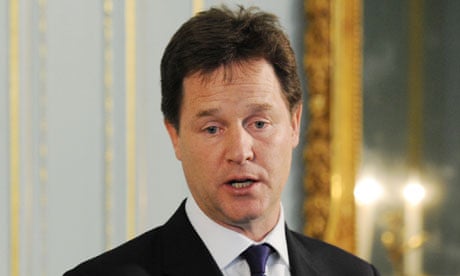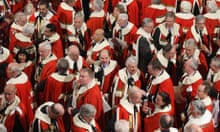Nick Clegg's plan for constitutional reform and David Cameron's scheme to shift parliamentary boundaries in the Conservatives' favour both lay in ruins on Monday as victims of the prime minister's inability to persuade his backbenchers to support an elected House of Lords.
A subdued and depressed Clegg announced he was abandoning all plans to reform the Lords in this parliament, adding as a result he will also be instructing his MPs to vote down revised parliamentary boundaries designed to reduce the number of MPs to 600.
He claimed that to reduce the number of MPs whilst leaving the Lords unreformed would only strengthen the executive against parliament, an argument denounced as "specious nonsense" by Tory MPs.
The announcement represents a personal blow to Clegg, who had championed widescale political reform as a distinctive Liberal Democrat contribution to the coalition but has been thwarted at virtually every turn.
It leaves the deputy prime minister increasingly reliant on an upturn in the economy, progress on social mobility and a broader liberal agenda to justify the original decision to form the coalition with Cameron.
A triumphant Labour party claimed announcement was a humiliation for the coalition, and a sign of the prime minister's weakness. Privately the party also added that the move sharply reduces the likelihood of a Conservative majority government at the next election, and makes the chances of the Lib Dems forming a second coalition government with the Conservatives increasingly remote.
The boundary review might have seen as many as 40 Labour and Lib Dem seats abolished.
Clegg himself accused the Conservatives of breaking the coalition contract, and said the failure of Labour to support a parliamentary timetable on Lords reform amounted to "student politics" and short-term opportunism.
Clegg conceded that the decision – relayed to Cameron in a blunt phone call on Monday morning – represented uncharted territory in the coalition, and created a vacuum in the coalition's legislative programme.
He said he wanted that vacuum to be filled by alternative measures either on further banking reform, social care or ways to help young people find jobs.
Cameron refused to admit that reform of constituency boundaries – a proposal which was due to be voted on by MPs and peers next year – was dead, and said the vote would go ahead, raising the prospect of Lib Dem ministers voting against the prime minister in the division lobbies.
Lib Dems said it would be more sensible if the still-incomplete boundary review was shelved now.
It is possible that Cameron still sees the boundary revisions as a bargaining chip he can deploy against his Lib Dem colleagues. Tory cabinet members pointed out the coalition agreement had linked boundary reform to the referendum on the alternative vote, and not to Lords reform, but Clegg countered they were part of a cluster of constitutional measures.
Clegg was eager on Monday to limit the damage from the collapse of Lords reform – insisting the government would still be anchored in the centre ground, and focused on delivering a revival of the economy, the reason the coalition agreement was made in the first place. He said a relationship of mutual trust and respect could be maintained with his partners.
But he admitted that it was the first time either coalition party had not delivered not just on what they have committed to each other but also to the electorate. "The Conservative party is not honouring the commitment to Lords reform and, as a result, part of our contract has now been broken," he said.
Clegg said that the Tory repudiation of the coalition contract requires "a balancing amendment" to the coalition contract, represented by the Lib Dems' decision to defer the date on which boundary review was implemented until after the next election.
The deputy prime minister argued: "Clearly the coalition cannot function effectively when one side of the coalition is picking and choosing the bits of the coalition agreement it does and does not like, and ... Liberal Democrat MPs are bound by the entire agreement."
He also rejected any plans for more limited Lords reform such as reducing the number of hereditary peers.
George Osborne, the chancellor, significantly more than Clegg, sought to pin the blame for the collapse of Lords reform on Labour. "We have not been able to proceed on Lords reform, frankly, because there is opposition in Parliament and the opportunism of the Labour party."
Osborne said MPs would consider the matter of the boundary review next year and the government would "cross any issues with the boundary vote when we get to them".
The chancellor insisted the coalition was strong and that the government would use the parliamentary time freed up by the withdrawal of the Lords plans to put forward proposals on jobs and growth.
"I think we have got to use this moment as an opportunity to focus 110% on the economy – which is what the country wants."
One of the ringleaders of the 90-odd Tory rebels, Jesse Norman, said : "I am very pleased that the government has decided to withdraw the Lords bill. It was a bad piece of legislation which would have undermined the constitution.
"The government has rightly said that the economy is the priority. But there is much the government could also do now to reform the Lords, including steps to reduce the numbers and remove those convicted of serious criminal offences.
"These reforms would be easy to implement, and would likely pass both Houses on a free vote."
Clegg's remarks suggest such proposals will be rejected by the Liberal Democrats for fear they would semi-legitimise an unreformed Lords.
Sadiq Khan, the shadow justice secretary, claimed it was "outrageous" for Clegg to blame Labour. Khan suggested it was the Conservatives who had "never been serious about reform".
The Lib Dem MP Martin Horwood said the Conservatives "had become the G4S of British politics" and had "failed to deliver."







